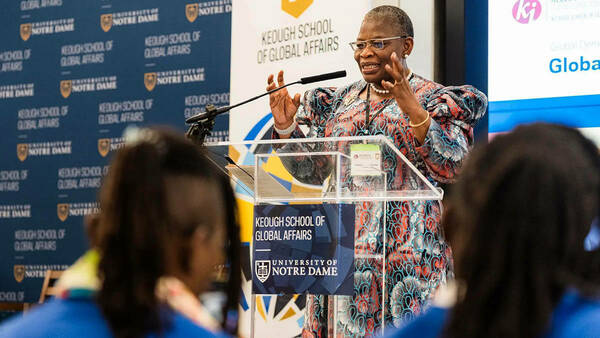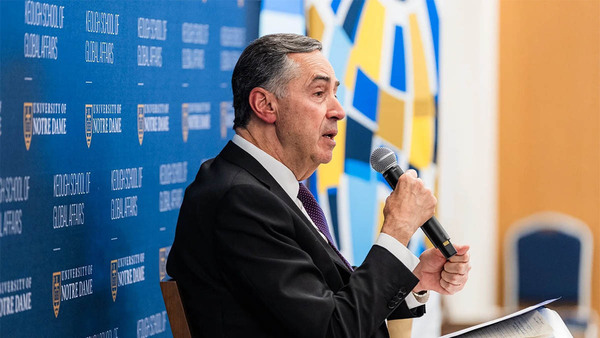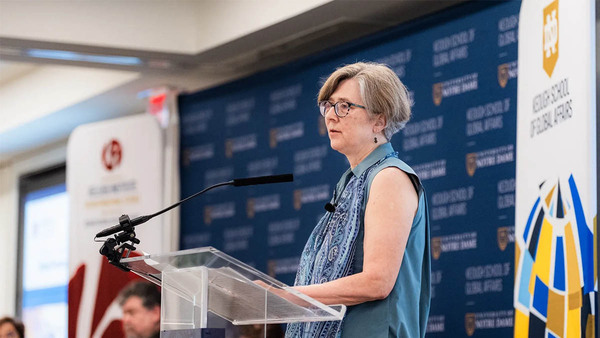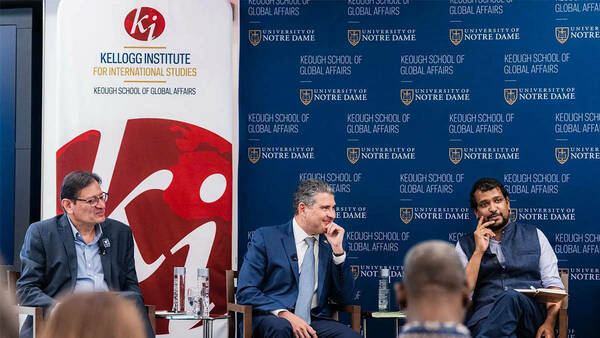Democracy erodes worldwide when executive power expands, experts warned during the University of Notre Dame’s second annual Global Democracy Conference May 12-13 in Washington, D.C.
A mix of scholars, policymakers and practitioners gathered for the convening, which was hosted by the Kellogg Institute for International Studies, part of Notre Dame’s Keough School of Global Affairs. The conference aligns with the Keough School's commitment to conduct research on democracy and human rights and with Notre Dame’s University-wide Democracy Initiative.
Participants, including Notre Dame faculty members who are Kellogg Institute faculty fellows, discussed how democracies are increasingly being hollowed out from within — not by coups, but by elected leaders who manipulate democratic institutions to consolidate power. In panels and “action labs,” speakers analyzed the phenomenon and shared suggestions for how a variety of actors — including political parties, media, appointed officials, jurists and everyday citizens — can defend democracy.
“For the past couple of decades, democracies around the world have declined in number, and the overall quality of democracy has declined as well,” said Mary Gallagher, the Marilyn Keough Dean of Notre Dame’s Keough School of Global Affairs. “Convening this conference is an important way to bring experts together to discuss these broader global trends and inform policy and practice, drawing on the deep democracy research expertise within our Kellogg Institute.”
The conversation comes at a key inflection point, experts said. According to data from Varieties of Democracy, the level of democracy experienced by the average person in the world has regressed in recent years and is now at levels not seen since 1985 — six years before the fall of the Berlin Wall marked the end of the Cold War. And while there is no Iron Curtain today, Varieties of Democracy has found that 7 in 10 people worldwide now live under autocratic regimes.
In response to these concerning trends, discussions provided a global comparative analysis, with case studies from more than a dozen countries, including Argentina, Bangladesh, Brazil, the Czech Republic, Colombia, Hungary, India, Mexico, Nigeria, Poland, Serbia, South Africa, Turkey and the United States.
“All over the world, concentration of power in the executive has had dire consequences,” said Aníbal Pérez-Liñán, director of the Kellogg Institute. “It leads to corruption, the dismantling of institutions and the erosion of civil liberties. In these conversations, we want to improve societies’ ability to identify anti-democratic behaviors, offer ways to resist them and foster additional opportunities for collaboration and research that will help strengthen democracy.”
Keynote speakers stress hope, action
 Prominent keynote speakers called for constructive action to shore up democracy, highlighting lessons from their own experiences.
Prominent keynote speakers called for constructive action to shore up democracy, highlighting lessons from their own experiences.
Obiageli “Oby,” Ezekwesili, a Nigerian policy expert, transparency advocate and former presidential candidate, described a growing gap between democratic ideals and on-the-ground reality. In Nigeria, she said, election irregularities undermined faith in institutions, making authoritarianism more attractive. But there is a solution, she said.
“If executive overreach is democracy’s growing threat, then our collective power and vigilance will be democracy’s greatest defense,” Ezekwesili said. She called for a suite of reforms including providing greater transparency, strengthening institutional capacity, teaching digital literacy, using technology ethically and providing stronger checks and balances. By training ethical leaders and educating citizens, Ezekwesili said, countries can address both the supply and demand sides of strengthening democracy.
Chief Justice Luís Roberto Barroso, president of the Supreme Federal Tribunal of Brazil, shared how the court had served as a check on President Jair Bolsonaro. Barroso detailed how Brazil’s supreme court handed down multiple rulings that pushed back when Bolsonaro overstepped his legal authority, using its power to defend rights protected under the Brazilian constitution. Rulings blocked overreach, Barroso said, and ultimately resulted in Bolsonaro being barred from running for office until 2030.
 “I think a court of justice should react in the first moment,” Barroso said. “You must step forward in the first moment and say, ‘there is a limit here; you cannot trespass.’ Even at the risk of losing, I think you should play your role.”
“I think a court of justice should react in the first moment,” Barroso said. “You must step forward in the first moment and say, ‘there is a limit here; you cannot trespass.’ Even at the risk of losing, I think you should play your role.”
In the closing keynote, A.G. Sulzberger, publisher of The New York Times and chairman of The New York Times Company, outlined how the Trump administration has repeatedly attacked the press, which he said is a crucial part of American democracy.
“As the free press and democracy more broadly face this period of pressure, I’d urge you to support both by seeking out news sources worthy of your trust,” Sulzberger said, later adding: “Engaging with the news is one of the simplest, most essential acts of citizenship. This is not the time to tune out.”
Discussions explore how to resist aspiring autocrats’ power grabs
Participants outlined the ways in which democratically elected executives chip away at freedoms while maintaining a veneer of legitimacy, and how to resist this trend.
Resistance begins with acknowledging the new reality: Democracies now fall not through dramatic coups, but through insidious and incremental executive overreach, said Scott Mainwaring, the Eugene and Helen Conley Professor of Political Science at Notre Dame and Kellogg Faculty Fellow. Globally, he pointed to the experience of countries like Russia, India, Turkey and Venezuela, which have seen democratically elected leaders seize undue power, exceeding constitutional limits.
How do countries and citizens address this reality? Panels emphasized the importance of creative, cross-sector collaboration. In a session on electoral management bodies and political parties, Laura Gamboa, assistant professor of democracy and global affairs at Notre Dame, praised strategies that leverage institutions rather than calling for more radical goals.
”Political parties are key not because they replace social movements,” Gamboa said, “but because they articulate a way for them to be relevant.”
 Similarly, in a panel on the role of civil society and social movements, Kellogg faculty fellow Ann Mische, associate professor of sociology and peace studies at Notre Dame, shared her research on the impact of “insider-outsider” coalitions that combine disruptive protests with pragmatic negotiations with power brokers.
Similarly, in a panel on the role of civil society and social movements, Kellogg faculty fellow Ann Mische, associate professor of sociology and peace studies at Notre Dame, shared her research on the impact of “insider-outsider” coalitions that combine disruptive protests with pragmatic negotiations with power brokers.
“These kinds of coalitions are hard,” Mische acknowledged. “But in the face of growing democratic threats, we need this kind of full-field approach to civil resistance.”
Collaboration is also important for career civil servants, experts said. While appointed officials may see themselves as neutral figures, there can be no neutrality when democracy is at stake, said Zsuzsanna Szelényi, founding director of the Democracy Institute Leadership Academy, part of the Central European University in Hungary — a country that has regressed in recent years under prime minister Viktor Orbán.
“You always have to take a side,” Szelényi said. “There is no in between. And ever act alone — you always have to look for allies.”
Panelists shared comparative perspectives to underscore best practices. Aidan Eyakuze, chief executive officer of the Open Government Partnership, recalled his experience reporting on the falling approval ratings of Tanzania’s former president. He recalled how an intermediary urged him to stop and instead indulge the president’s well-documented love of public flattery; how his passport was seized when he refused; and how he ultimately successfully sued to get it back, driving home the lesson that democracy advocates must contest every space.
Likewise, Ewa Kulik-Bielinska, executive director of the Stefan Batory Foundation, shared lessons from Poland, stressing the need to listen to everyday citizens and offer solutions, not just protests of existing policies.
Countering false information
Discussion also focused on combating misinformation and disinformation that has become increasingly prevalent in recent years.
Amb. (ret.) Kelley E. Currie, a nonresident senior fellow jointly affiliated with the Atlantic Council’s Indo-Pacific Strategy Initiative, part of its Scowcroft Center for Strategy and Security, and with the council’s Freedom and Prosperity Center, noted that democracy advocates needed to mindfully address critiques that some of their past work to counter misinformation have been part of a “censorship-industrial complex” that targets the political right.
“It’s easy, I think, for people on the left to dismiss this and to not take these narratives seriously but I think that it's a mistake to do that,” said Currie, who served as the United States’ ambassador-at-large for global women’s issues from December 2019 to January 2021. “And I think that the underlying causes of this need to be addressed, and why these narratives of this censorship-industrial complex have been able to take hold so strongly on the right. She added, “I think the antidote to that is to be honest and admit mistakes, be really transparent and acknowledge what's going on.”
 David Salvo, managing director of the Alliance for Securing Democracy at the German Marshall Fund of the United States, a nonpartisan, nonprofit organization focused on transatlantic affairs, agreed.
David Salvo, managing director of the Alliance for Securing Democracy at the German Marshall Fund of the United States, a nonpartisan, nonprofit organization focused on transatlantic affairs, agreed.
“I would just say, as somebody who is also facing the heat for the work that we do and has been part of the narrative about the censorship-industrial complexly — unjustifiably, I would argue — I think we have to get out of the business of evaluating content,” Salvo said. “And I know as a field, many of us have been moving in that direction. We really need to focus on tactics and tools, because it's the only way, I think, to demonstrate to people who are inclined not to believe a word we say that they, too, are being targeted.”
Salvo called for creative approaches to countering misinformation, including partnering with online influencers to better reach the public: “We have to find messengers, maybe nontraditional messengers from our lines of work, who are going to be the voices in their communities to continue this fight, especially in the information domain.”
Media experts like Michael Mirny, director of the Information and Media Practice at IREX, a media development and education organization, and James Okong’o, a Kenyan journalist and fellow at Harvard University’s Nieman Foundation for Journalism, shared how misinformation spreads more effectively than real news on social media, owing to its emotionally charged content, and how skeptical citizens who think critically can resist its siren call.
A global challenge
John T. McGreevy, the Charles and Jill Fischer Provost of the University of Notre Dame, noted that the values that undergird democracy — human dignity, justice, solidarity and the pursuit of the common good — are central to Catholic social teaching and the University’s commitment to study and strengthen democracy.
“As a leading global Catholic research university, Notre Dame recognizes that the health and resilience of democracy is not just an academic concern but a moral imperative,” McGreevy said. “American universities, including Notre Dame, must rise to the challenge.”
Defending democracy: Top takeaways from the conversation
• Globally, executive overreach is now the leading cause of democratic backsliding.
• The process of executive overreach and democratic erosion is incremental. But speed and a sense of urgency are key to responding to threats.
• Resisting overreach requires contributions from a variety of actors, including civil society, political parties, media, electoral management bodies, appointed officials, the judiciary, scholars and everyday citizens. No one group has all the tools, but each has a part to play in defending constitutional rights and democratic freedoms.
• Misinformation and disinformation spread quickly, often through channels such as social media and messaging apps. Media and digital literacy is key to supporting a more informed citizenry, and training interventions, particularly those that teach healthy skepticism and critical thinking, can help.
• Defending democracy requires creative collaborations and coalition-building among different actors and groups.
• Democracy advocates must work persistently and use every tool at their disposal to fight backsliding.





